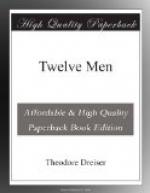“What is it, Mr. White?” he inquired.
“Your Honor,” returned the latter in his most earnest and oratorical manner, “this man here, as you may or may not know, is an old and honorable citizen of this county. He has been here nearly all the days of his life, and every day of that time he has earned an honest living. These people here,” he said, gazing about upon the interested spectators, “can witness whether or not he was one of the best tobacco pickers this county ever saw. Mayhew,” he interrupted himself to call to a spectator on one of the benches, “you know whether Uncle Bobby always earned an honest living. Speak up. Tell the Court, did he?”
“Yes, Mr. White,” said Mayhew quickly, “he did.”
“Morrison,” he called, turning in another direction, where an aged farmer sat, “what do you know of this man?”
Mr. Morrison was about to reply, when the Court interfered.
“The Court knows, Mr. White, that he is an honest man. Now what would you have it do?”
“Well, your Honor,” resumed the speaker, indifferently following his own oratorical bent, the while the company surveyed him, amused and smiling, “this man has always earned an honest living until he injured his hand here in some way a number of years ago, and since then it has been difficult for him to make his way and he has been cobbling for a living. However, he is getting so old now that he can’t even earn much at that, except in the spring and summer, and so I brought him here to have him assigned a place in the county infirmary. I want you to make out an order admitting him to that institution, so that I can take it and go with him and see that he is comfortably placed.”
“All right, Mr. White,” replied the judge, surveying the two figures in mid-aisle, “I so order.”
“But, your Honor,” he went on, “there’s an exception I want made in this case. Mr. Moore has a few friends that he likes to visit in the summer, and who like to have him visit them. I want him to have the privilege of coming out in the summer to see these people and to see me.”
“All right, Mr. White,” said the judge, “he shall have that privilege. Now, what else?”
Satisfied in these particulars, the aged citizen led his charge away, and then went with him to the infirmary, where he presented the order of the Court and then left him.
Things went very well with his humble client for a certain time, and Uncle Bobby was thought to be well disposed of, when one day he came to his friend again. It appeared that only recently he had been changed about in his quarters at the infirmary and put into a room with a slightly demented individual, whose nocturnal wanderings greatly disturbed his very necessary sleep.
“I want to know if you won’t have them put me by myself, Mr. White,” he concluded. “I need my sleep. But they say they can’t do it without an order.”
Once more the old patriarch led his charge before the Court, then sitting, as it happened, and breaking in upon the general proceedings as before, began:




